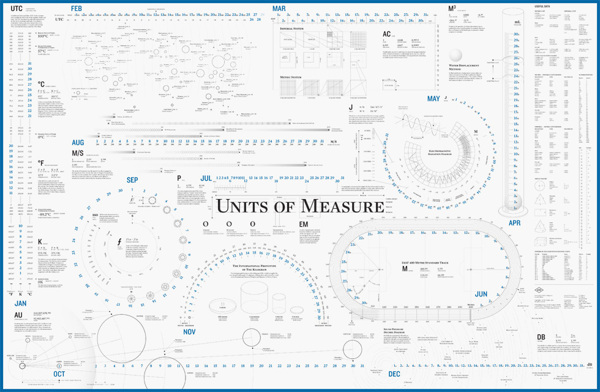We had the opportunity to work with a bunch of really passionate health education experts from the Departments of Health in 10 different US States. It was fascinating, really. (The project as a whole probably deserves an essay, but that would be a lot longer than a blog post.) Over days of conf calls, we moved the target from "health literacy" to "health knowledge that actually matters." In the case of stroke, for example, we decided that knowing that someone might be having a stroke, mattered a lot more than understanding the underlying causes of stroke.
One of the pitched battles that I lost came to mind when I ran across this very cool "Units of Measure" poster. (Yeah, I want this hanging on the office wall!)
The battle was over blood pressure measurements.
Do you know your most recent BP measurements? Hint, it's one number over another number. Honestly, I couldn't remember mine when we got to that topic - other than "good."
Do you know what each measure represents? Here's a handy explanation video that (we hope) makes that more memorable.
The unit of measure for blood pressure is millimeters of mercury. No, we don't tend to have mercury getting pushed up a glass tube any more, but the digital readout on your blood pressure monitor is using the same terms.
What I argued - unsuccessfully - was that the measures are arbitrary, and (consequently) difficult to understand. Systolic ranges from 90 to 180, diastolic from 60 to 110; systolic above 140 is BAD, diastolic above 90 is BAD. Argh! I know it's just a few numbers, I know it's important, but even a simple table of those numbers just doesn't stick. My proposed solution - combine the numbers and try to make that one combined number stick in people's heads. Combined measure of bad is 230.
If you watch the video, you'll see the time for the surprise party is 2:30. We had a line in the voiceover, something like "If it's past 2:30, it's time to see your doctor!" The health experts argued that the BP system of measure is too well-established and too well-understood. They were the client, OK, we won't talk about combined measures.
I still don't agree. I remembered 2:30 but I had to go look up the stupid arbitrary number ranges to write this post! :-)
Something as simple as a unit of measure has a powerful long-term effect - the story about horse's asses and the space shuttle is worth looking up. I hope that over time we'll be more deliberate about selecting new measures with a bias toward learnability and recollection - "human-scaling" them, if you will. If you're defining measures for a business, include "can anyone understand these and/or remember them" in your set of criteria.
Is that minutia? I don't think so. In the case of health literacy, it really is life-or-death important. When we're making decisions, the things we know & understand are going to trump the answers we could get from search engines - at least, I'd like to think that's the case. It's certainly the bias we bring to our work.
Enough. Go check your blood pressure! If it's past 2:30...
--md


